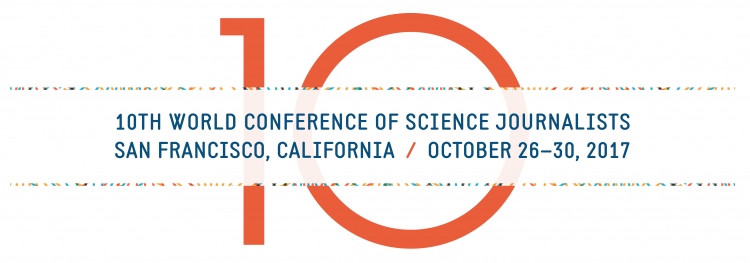
Ms. Karel Lopes, a graduate student from Québec, attended the recent 10th World Conference of Science Journalists (WCSJ2017) in San Francisco thanks to the financial support of the Fonds de Recherche du Québec . She shares her experience and thoughts on the conference in two articles and captures an interesting perspective on organizing scientific events.
ARTICLE #1 – The scientific culture under capital’s parental authority?
In the ballroom of one of the biggest hotel in the city, surrounded by more than 500 people, I was enjoying a fancy three-course meal. An embarrassing privilege which was made possible by means of Johnson & Johnson’s generosity – Yes absolutely, Johnson & Johnson, the 280 billion of capitalization multinational corporation, was the very first backer of WCSJ 2017 – As for me, this collaboration seemed to be in total contradiction with the very goal of the event: support critical journalism toward society, sciences, and industry.
In a knowledge and technique society that keeps evolving, the bases of our credibility are more than ever “responsibility and integrity”. Yet it is obvious that this kind of financial link always brings doubts regarding the real autonomy of the organization. Many questions arise.
What were the terms of such a support? How did the financing influence the programme of the event? And the people who were invited? How about the speeches that were given? But most of all why did this seem so “normal” to the very majority of the attendees?
Indeed the people that I met there and that were actually concerned about the presence of private financing in scientific activities/diffusions were too rare. This critic is not meant to blame my colleagues or the WCSF 2017 organizing committee but aims for a more systemic thinking. Indeed what independence can science and journalism still hope for when it is nowadays indispensable to obtain the support of multinational corporation like Johnson & Johnson – which ethics and practices are by the way very questionable – to set up conferences that aim to develop scientific and critical journalism?
Finally, the issue of private financing is not a new one, but it is increasingly worrying as it may put at risk one of the necessary virtues of a critical dialogue between science, industry, and society: independence!
ARTICLE #2 – When science prefers lifestyle to social and environmental ethics
“Ethical expertise relies on the development of a reflexive culture. It implies authenticity, integrity, coherence between the being, the speech and the acting.”
Every day, besides reading articles about climate change, I do my best to adopt ecological habits, to control my urge for consumption and especially to deconstruct my logic and my thinking in order to get closer to coherence between my scientific discourse and the way I behave in my everyday life. My decision to go to the WCSJ 2017 was, therefore, a long-considered one given the fact that this conference releases another 850 kg of CO2 into the atmosphere. Attending this conference about climate changes would nonetheless enrich my knowledge and my thinking, so that was a tricky one. I could not find a solution to my own ethical inconsistency… except to notice it and accept it. I, therefore, decided to commit myself to write about discordances between speeches and behaviors that I could observe during the WCSJ.
Here is my TOP 3:
1) During the week, conferences about climate change were popular AND most of the attendees came to listen to the speaker with plastic cups and bottles. The audience mostly consisted of science journalists, students, and professors –educated people who are actually interested by the subject (…) “If change happens through exemplary behaviors, it is not about to happen.”
2) While I was listening to a speech about the egalitarian prospects “Who Will Do Science?” I was trying to count how many employees were busy serving us. While essential, their number and presence were ignored by everyone. At my table, no one thanked them nor looked at them. They were working for one of the city`s big hotels and most of them seemed to come from diverse ethnical backgrounds. It was so easy to guess the working conditions and precariousness of their everyday life. At the very same time, we were listening to a speech about the egalitarian prospects (…) There was so much food on the tables while there simultaneously were people looking for food on the streets around the hotel, people that we were sort of ignoring while walking by them every day. (…) Despite all my principles about equity and social justice I was participating in maintaining the system that I denounce in my work. I lost my appetite before the first bite.
3) The California Academy of Sciences had been rented for the WCSJ 2017 Gala reception. More experienced colleagues estimate that this one night cost 200’000 $. How can the community of scientists and critical journalists that are working on big issues of our era (health disparities, social injustices, accessibility, degradation of the environment) put aside ethical consideration when organizing their own events?
Was it really necessary to enjoy a 200’000 $ night? With so many brilliant minds gathered together, could we have done something more constructive than enjoying selfishly our privileges? What project could we have come up with we’ve instead been working in groups with an 8000 $ budget each? Wouldn’t exchanges and networking be more interesting through the rallying of collective intelligence?
For a social and environmental ethics in the organization of scientific diffusion events.
Articles by Karel Lopes, a graduate student from Montréal, Québec